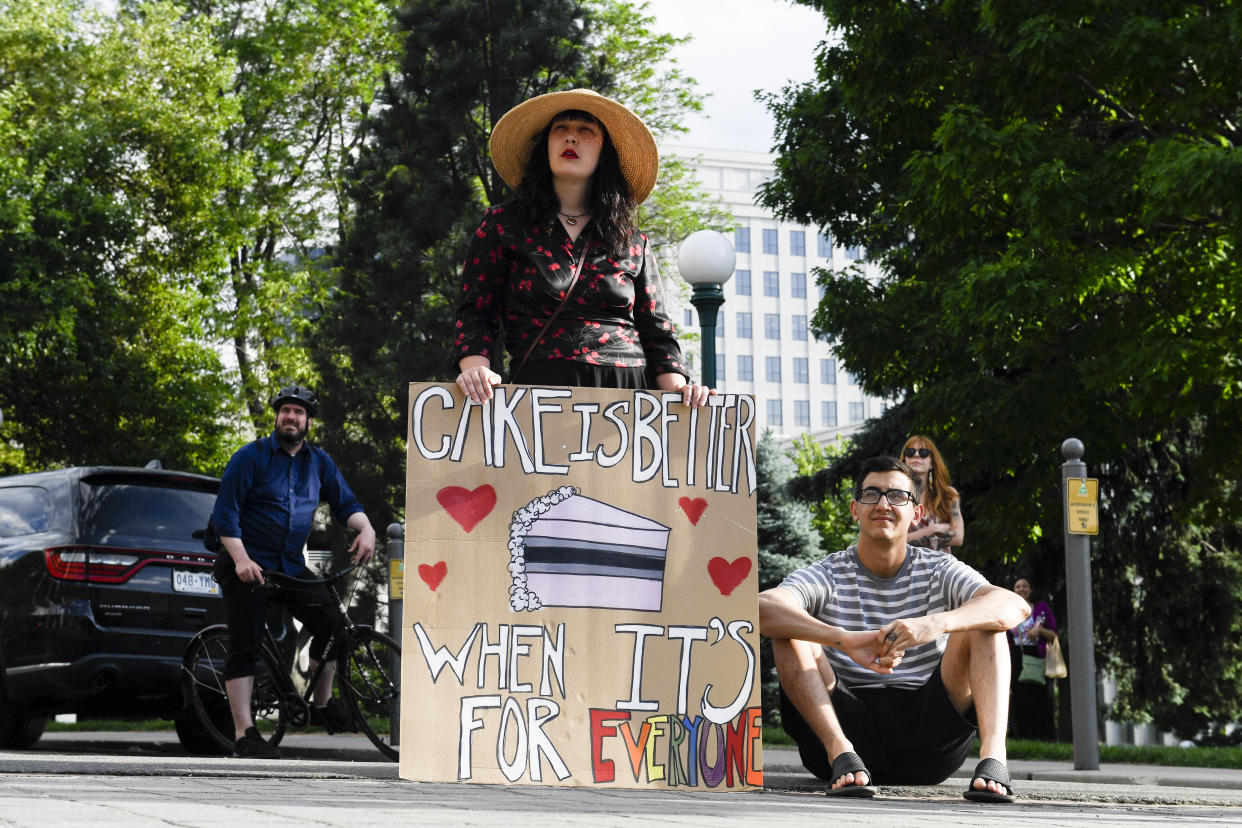Has Masterpiece Cakeshop ruling inspired more wedding vendors to refuse service?

In June, the Supreme Court ruled in favor of Masterpiece Cakeshop’s Jack Phillips, the Colorado baker who said that making a cake for a gay wedding would violate his religious beliefs. Though the ruling was limited — it said that the Colorado Civil Rights Commission displayed anti-religious bias — and did not make any further pronouncements about anti-discrimination laws, some suspect that the effects of the case are already rippling down to wedding vendors across the country.
Last week, in Charlottesville, Va., Paula Fries and Katie Brown shared the story of how a videographer they had planned to hire for their wedding pulled out just before they signed a contract.
“We have decided that we would not be the best match to film your wedding,” Gardenia Weddings owner Brett Sandridge said in an email Fries shared on Facebook. “We are just really wanting to stay true to our beliefs.”
Brown told her local CBS affiliate it was a reminder that there are still people who don’t think she deserves equal rights.
“It demonstrates to me the value system some people still have, and it makes me so sad,” she said. “It feels like we’re not on equal footing with heterosexual couples.”
That same week, David Elliott told Indiana’s WRTV that when the owner of Avon Florist in Avon, Ind., realized he was planning his wedding to another man, she abruptly told him, “Well, then, I’m going on vacation. And I can’t help you.”
Neither Indiana nor Virginia has laws in place protecting people from discrimination on the basis of sexual orientation, so these couples could do nothing but share their experiences with others via social media and their local news. But that alone can be quite helpful to others, says Jennifer Pizer, the law and policy director for Lambda Legal.
“The fact that they told their story allows other people to understand this kind of discrimination does happen in lots of places, every day of the week, and it’s largely invisible to other people who don’t experience it,” Pizer tells Yahoo Lifestyle.
These couples are not just spreading the word about one business mistreating them — though judging by the Yelp reviews Avon Florist has received, that is one effect of this story. They’re also giving voice to others who don’t feel they can speak up. For every story we read about in the news, there are many more incidents of people being turned away and internalizing the hurt they experience, Pizer says.
“Nobody needs to worry about having the door slammed in their face just because of who they are, and have to go from place to place wondering where they might be served and where they might be treated like a pariah,” she says. “We shouldn’t have to keep learning that same lesson over and over.”
Despite the limited nature of the Masterpiece ruling, Pizer says it has encouraged groups like the Alliance Defending Freedom to continue to call for businesses to refuse service based on religious beliefs. This has been going on for a number of years, however, and Lambda does not have any numbers to show whether there has been an uptick in cases since the Masterpiece ruling.
The ADF offers free legal help to people who want to challenge local and state anti-discrimination laws. It represents Brush & Nib, a calligraphy business in Phoenix, in a lawsuit stating that the city’s law violates its rights by requiring it to create invitations for gay and lesbian weddings. Days after the Masterpiece ruling, the Arizona Court of Appeals upheld the Phoenix law, stating that if the owners of Brush & Nib “want to operate their for-profit business as a public accommodation, they cannot discriminate against potential patrons based on sexual orientation.”
The ADF says it is taking the case to the Arizona Supreme Court.
“It’s been a core legal principle that each individual freedom is constrained by the duty not to hurt other people, and the recognition that discrimination in the public marketplace is harmful,” Pizer explains. These cases are challenging that principle.
“It is important that we all acknowledge that protection for religious freedom is supposed to be a shield so everyone has room to believe as they will,” Pizer says. “That freedom must not be turned into a sword to be used against other people.”
Read more from Yahoo Lifestyle:
ESPN announcer Matt Vasgersian mocks bachelorette parties at baseball games, and people aren’t happy
This is how Kim Kardashian does wedding wear — is it appropriate?
Follow us on Instagram, Facebook, and Twitter for nonstop inspiration delivered fresh to your feed, every day.

